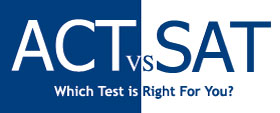|
 | ACT.ORG TESTS | ACT.ORG TESTS |
|
This standardized test is designed to assess high school students' general educational development and their readiness to complete college-level work. It is used for college admission decisions, some scholarship qualifications, and NCAA eligibility. All U.S. colleges and universities accept ACT results. When does my student take the test? The ACT is offered six times during a given school year. These are usually in September, October, December, February, April, and June. Students generally take the test first during the spring of their junior year. It is best to take it as early as possible, as your student may want to take the test again to get the best score possible. For exact dates, you can go to: http://www.actstudent.org/regist/dates.html. When and how do I register? A registration packet should be available at your student’s high school, but you may also register online at www.actstudent.org. Try to register at least eight weeks in advance. The sooner your student registers, the easier it is to get your student’s ideal location. Each test date has its own registration deadlines and locations available. What is the test's structure? The ACT consists of four multiple-choice tests in English, math, reading, and science, as well as an optional writing test. We highly recommend you take the optional essay. Many times students decide not to take it and colleges ask that they take them again. Here is a more detailed explanation of each section:
How is it scored? Each subject (English, Math, Reading and Science) is scored 1-36 and then the composite score is calculated as an average, the highest being a 36 overall. The scores are rounded to the nearest whole number. Fractions less than one-half are rounded down; fractions one-half or more are rounded up. Each score is a scale score – which means that is equivalent to all the different forms of the ACT, no matter which test date a test was taken. Since the ACT Essay section is optional, its score does not affect the overall Composite score. How many times can I take the test? A student can take the test multiple times without penalties. But, we recommend no more than three attempts. What should my student bring to the test? Your student should bring an approved calculator, a snack, pencils, your ticket, and a picture ID. Do not bring phone. Which Calculators are approved? Many well-known brand calculators are prohibited such as the following: Texas Instruments: any model that begins with TI-89 or TI-92 or the TI-Nspire CAS—(TI-Nspire (non-CAS) is permitted); Hewlett-Packard: hp 48GII and any models that begin with hp 40G or hp 49G; Casio: Algebra fx 2.0, ClassPad 300, and any model that begin with CFX-9970G. In essence, any calculator with a built-in computer algebraic system will not be allowed. For up-to-date information on prohibited calculators, please visit: http://www.actstudent.org/faq/calculator.html. What are the costs of the test? The test costs change year by year; in fall 2013 it is $52.50, when you include the writing section. For updated information on fees please visit, http://www.actstudent.org/regist/actfees.html. Can I change a date once registered? Yes, life situation may keep your student from being able to meet a previous commitment and thus you may need to change a date. The ACT organization will charge a change date fee, which at the present time, is $21. Can I get a copy of the test? Yes, you may if you order the Test Information Release (TIR) it within three months of the date in which the test was taken but ONLY the following test dates: December, April and June. For more information about this service please go to http://www.actstudent.org/scores/release.html. What is the registration schedule for the current academic year and when should I start preparing? It will all depend on the date – see our OFFICIAL TEST TRACKER. (view now) Is the ACT easier than the SAT? No. However, here's a better question: “Is the ACT easier or better than the SAT for me?" The best way to determine this is to take Chyten's ACT vs. SAT Comparison Test. Some students definitely do find the ACT to be easier than the SAT, while others find it equally or even more difficult. The ACT tends to be more straightforward and less cryptic than the SAT. ACT has a Science section; 84% of the ACT Science questions involve data analysis, mostly interpreting graphs and charts. ACT grammar has a different emphasis than does SAT grammar, and the questions are all reading-passage based. Many consider the ACT Reading section to be harder than the SAT Reading section. For many, it is difficult to finish within the time allotted. Unlike questions on the SAT, the ACT reading questions do not follow the order of the passage. Slow readers may have a great deal of difficulty with the ACT. Should I take the ACT in addition to the SAT? No. For most students, that is not a good idea. First, figure out which test is best, then focus on that test. Chyten's ACT vs. SAT Comparison Test is a great place to start. I have heard that Midwest colleges prefer the ACT, while East Coast and West Coast Colleges prefer the SAT. Is this true? No. Colleges do not prefer one over the other. Marilyn McGrath-Lewis, director of admissions at Harvard University says, “Either is fine with us, and we don't have a feeling that either favors students with any particular profile.” It would be difficult to find one college that does not accept the ACT as readily as it accepts the SAT. Some colleges even accept the ACT in lieu of both SAT and SAT Subject Tests! |
|
|
PLANWhat is the PLAN? The PLAN is the pre-ACT test taken to help students predict how well they will do on the ACT, and, in some cases, can have bearing for scholarship. It is a comprehensive guidance tool that helps a student measure his academic development, explore career/training options, and make plans for the remaining years of high school and post-graduation years. When do I take the PLAN? The PLAN is usually taken during the tenth grade. How do I register? The PLAN is usually administered by high schools. See your student’s guidance counselor for more information, or go to www.actstudent.org/plan. What is the PLAN’s structure? This is a four part multiple-choice test structured very similarly to the ACT with sections covering English, math, reading and science.
|
|
|
|
Start with our ACT vs. SAT comparison test to help you decide if the SAT or ACT is a better test for your student. For more information on our ACT or PSAT/SAT test prep classes, please visit our current testing schedule page. |




 The Official ACT Test
The Official ACT Test